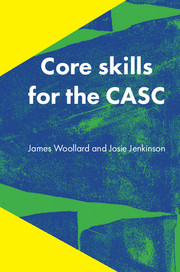Book contents
- Frontmatter
- Contents
- Abbreviations
- Preface
- Introduction
- Part 1 Core skills
- 1 Core communication skills
- 2 Verbal communication skills
- 3 Taking control
- 4 Structured presentations
- 5 Physical examination, investigations and cognitive assessment
- Part 2 Planning your preparation
- Part 3 Putting skills into practice – mock stations
- Resources
- Appendix
- Index
2 - Verbal communication skills
from Part 1 - Core skills
Published online by Cambridge University Press: 01 January 2018
- Frontmatter
- Contents
- Abbreviations
- Preface
- Introduction
- Part 1 Core skills
- 1 Core communication skills
- 2 Verbal communication skills
- 3 Taking control
- 4 Structured presentations
- 5 Physical examination, investigations and cognitive assessment
- Part 2 Planning your preparation
- Part 3 Putting skills into practice – mock stations
- Resources
- Appendix
- Index
Summary
The techniques in this chapter focus on gathering information and beginning to manage the flow of a scenario.
Unless you feel very confident, to develop the following techniques try practising them one at a time during an interaction – ideally the next time you see a patient in your clinical practice. You may well overuse them at times and find that the flow of the conversation becomes too broken up. Once through this stage you will get to a point of using them appropriately without overdoing it. By the time you get to the exam you should be blending them together to create a flowing conversational style, which you can maintain despite any distractions, derailment or frank confrontation by the patient. In this chapter we will cover the following verbal communication techniques:
• open/opening and closed/closing questions
• clustering
• signposting
• summarising
• helicoptering
• reflecting
• normalising experiences
• using and bouncing.
Question types
Open/opening questions
An open question is one to which there might be a great variety of responses. ‘What happened to bring you into hospital?’ is an open question. Starting with an open question has many advantages. It allows the patient to start with what they may find important or most upsetting. It facilitates the building of rapport as you can begin to gather useful information through the variety of responses they might give. With this in mind, it is generally a good idea to start with an open question.
The disadvantage of open questioning is the potential for you to gain irrelevant information (i.e. not relevant to the task at hand in the exam station) or for the patient to become side-tracked. So continuing to use open questions has its down sides. If you are not getting the information you need, you may need to rethink your approach.
Closed/closing questions
When you want to hone in on particular details of what a patient is telling you, you may wish to ‘close’ the questioning. A closed question is one that limits the potential responses from the patient. This allows you to gain specific information and therefore to be more certain of what is going on for your patient.
- Type
- Chapter
- Information
- Core Skills for the CASC , pp. 12 - 18Publisher: Royal College of PsychiatristsPrint publication year: 2016



